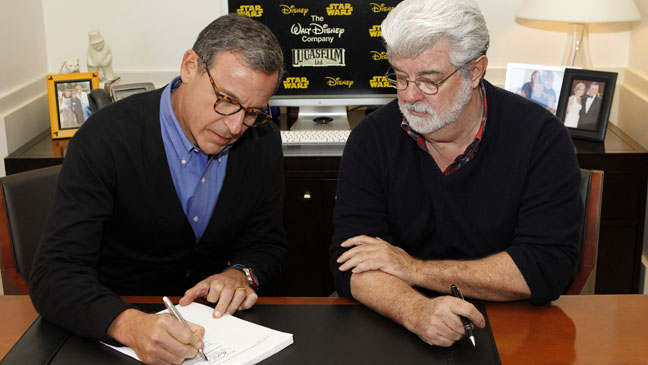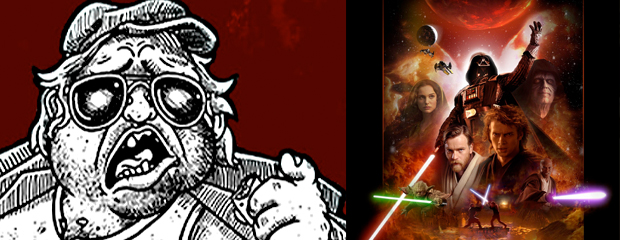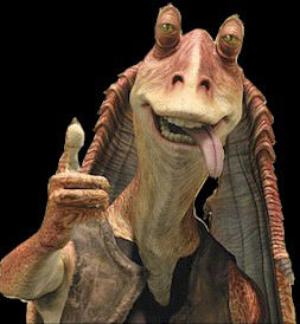On October 30th, the Walt Disney Company announced that it would be acquiring Lucasfilm Ltd, including the rights to the Star Wars franchise. Included in the press release was the goal for a new installment of Star Wars, Episode VII, to be released in 2015. As could be expected, the internet exploded. Fans of both companies seemed simultaneously intrigued, frightened, and perhaps most commonly, worried. Though wildly popular, the Disney brand has become synonymous with global capitalism and horizontal integration, which is understandably disconcerting, and Lucasfilm’s status has been steadily slipping in the eyes of its fans, arguably since the release of Star Wars Episode I: The Phantom Menace in 1999. When news broke that these two media giants would be uniting, geeks like myself everywhere wondered, what does this mean? And despite the flash of the Episode VII announcement and the promise of more Star Wars films in the future, it seems to me that the answer is… probably nothing.
A similar outcry arose three years ago when Disney acquired Marvel Comics, and fans lamented what they observed as the death knell of some of their favorite stories and characters, many of which may not have fit the wholesome, family-friendly “Disney” image. These fears were largely unfounded, as Disney has been buying smaller companies without holding their content to the “Disney” standard for years. Subsidiaries like ABC, Lifetime, Miramax, ESPN, and Touchstone have all managed to put out content for adult sensibilities without being excommunicated from the Disney family. As should have been apparent since the Marvel deal was struck, and has been made very clear in the years since, superheroes, sex appeal, and violence are doing just fine. The only major change has been that Disney is at the helm now and, with its abundance of capital and resources, is in a much better position to create megahits like, say, The Avengers (and of course, pocket the cash that comes with them.)
So while three years ago Marvel fans worried that their beloved fandom would be ruined by Disney, it seems that today’s Star Wars fans worry about the same thing. However, I’m more inclined to agree with the Star Wars fans of old, those bitter cynics whose hearts have been broken and turned to ice since the critically panned prequels. These tired masses see the light at the end of the acquisition tunnel, and that light is, no more George Lucas*.
In the infamous Red Letter Media Star Wars reviews, “Mr. Plinkett,” our strange narrator, notes that the overwhelming problem with the prequels was Lucas’ tightening grip on the franchise. With no one to challenge him creatively, the series suffered from narrative inconsistencies, poor character development, and just plain bad ideas that made it into the films.
The Red Letter Media reviews (and many fans) argue that Lucas works best in collaboration with other creators, writers, and directors, as it was when he made the original trilogy. When he is given complete control, the finished product is ultimately unbalanced and indulgent. When looking at the acquisition from this angle, it’s easy to see how older Star Wars fans might be optimistic about the potential for future Star Wars productions, since Lucas’ presence in them would likely only be as a creative consultant, the kind of work he does so brilliantly. The choice to move forward in the Star Wars canon with Episode VII may also be reason to hope, as a sequel has inherently more draw than a prequel, if only for the simple reason that we don’t go into the film knowing how it ends.
Basically, it does not seem that people are surprised by the deal. Past collaboration between Disney and Lucasfilm has been no secret, with Star Wars-themed merchandise and attractions finding their way into Disney stores and theme parks. But folks are certainly wary about what it means for the future of one of the most popular, best-loved science fiction sagas in recent history. Personally, I’m taking a wait-and-see attitude, with a fair heaping of skeptical optimism. Disney can tend to overdo it with sequels and marketing, and there is the definite possibility of the world getting Star Wars-fatigue once new films start to get cranked out with more regularity, but… it can’t be any worse than the Special Editions, right?
*I should note, since it’s easy to start a pile-on, this is not to say that George Lucas is a terrible person. In fact, this article from the Hollywood Reporter states that he is planning to give all the money from the Lucasfilm deal to education-focused charity, which is pretty damn awesome. So, we don’t hate you, George, we just hate that you introduced us to this guy:




